|
|
|
Sort Order |
|
|
|
Items / Page
|
|
|
|
|
|
|
| Srl | Item |
| 1 |
ID:
132143
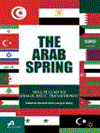

|
|
|
|
|
| Publication |
New York, Palgrave Macmillan, 2012.
|
| Description |
317p.Pbk
|
| Standard Number |
9781137344038
|
|
|
|
|
|
|
|
|
|
|
|
Copies: C:1/I:0,R:0,Q:0
Circulation
| Accession# | Call# | Current Location | Status | Policy | Location |
| 057828 | 320/HEN 057828 | Main | On Shelf | General | |
|
|
|
|
| 2 |
ID:
128175
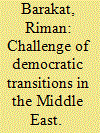

|
|
|
|
|
| Publication |
2012.
|
| Summary/Abstract |
The younger generation should focus on gradual and systematic social change that includes promoting human rights values and various freedoms.
|
|
|
|
|
|
|
|
|
|
|
|
|
|
|
|
| 3 |
ID:
110559
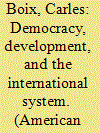

|
|
|
|
|
| Publication |
2011.
|
| Summary/Abstract |
Resolving a controversy on the relationship of development to democratization, this article expands the time period under study with panel data running from the early nineteenth century (a time where hardly any country was democratic) to the end of the twentieth century, and shows a positive and significant effect of income on the likelihood of democratic transitions and democratic consolidations. The estimations hold after I control for country and time effects and instrument for income. Results reveal that the effect of income varies across income levels and across eras. First, income has a decreasing marginal effect on democratization. In already developed (and democratized) countries, any extra growth has no further effect on the level of democracy. Second, the structure of the international system affects the resources and strategies of pro-authoritarian and pro-democratic factions in client states. The proportion of liberal democracies peaks under international orders governed by democratic hegemons, such as the post-Cold War period, and bottoms out when authoritarian great powers such as the Holy Alliance control the world system.
|
|
|
|
|
|
|
|
|
|
|
|
|
|
|
|
| 4 |
ID:
127719
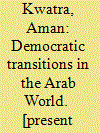

|
|
|
|
|
| Publication |
New Delhi, Delhi Policy Group Publication, 2013.
|
| Description |
ix, 45p.Pbk
|
| Contents |
Conference Report
|
| Standard Number |
9788187206330
|
|
|
|
|
|
|
|
|
|
|
|
Copies: C:2/I:0,R:0,Q:0
Circulation
| Accession# | Call# | Current Location | Status | Policy | Location |
| 057599 | 321.809174927/KWA 057599 | Main | On Shelf | General | |
| 057891 | 321.809174927/KWA 057891 | Main | On Shelf | General | |
|
|
|
|
| 5 |
ID:
153938
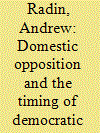

|
|
|
|
|
| Summary/Abstract |
A substantial literature urges delaying elections and liberalization in postwar societies. There is little work, however, on when and how international missions that intend to delay elections and the transfer of sovereignty, such as those in Kosovo and Iraq, are able to do so. To fill this gap, I propose a theory that identifies conditions under which two forms of domestic opposition—elite objections and mass demonstrations—can at times force the international community to adopt an earlier transition plan. Following the predictions of the theory, I show that international occupations in Kosovo and Iraq were only able to implement their preferred transition plans when conditions were unfavorable for domestic opposition: when the absence of centralized authority within key groups makes an elite boycott unlikely, and when international policy does not threaten a major group's nationalist goals, making the emergence of widespread mass demonstrations doubtful. The implication for policy is that attempting to delay elections and liberalization is only advisable when domestic opposition is unlikely to be effective.
|
|
|
|
|
|
|
|
|
|
|
|
|
|
|
|
| 6 |
ID:
142703
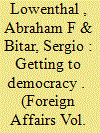

|
|
|
|
|
| Summary/Abstract |
Almost five years ago, mass protests swept the Egyptian autocrat Hosni Mubarak from power. Most local and foreign observers believed that Egypt was on the path to a democratic future; some even proclaimed that democracy had arrived. But the election of Mohamed Morsi and the Muslim Brotherhood’s Freedom and Justice Party led to polarization and violence, and in 2013, after more mass protests, General Abdel Fattah el-Sisi seized power in a military coup. Since then, Sisi’s regime has killed more than 1,000 civilians, imprisoned tens of thousands more, and cracked down on media and civil society.
|
|
|
|
|
|
|
|
|
|
|
|
|
|
|
|
| 7 |
ID:
138421
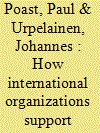

|
|
|
|
|
| Summary/Abstract |
Democratization in the developing world is, according to Samuel Huntington, “an important—perhaps the most important—global political development of the late twentieth century.” While scholars of comparative politics have explored the domestic political economy of democratic transitions, they, along with scholars of international relations, also recognize that international actors, particularly international organizations (IOs), are crucial for successful political transformation.
|
|
|
|
|
|
|
|
|
|
|
|
|
|
|
|
| 8 |
ID:
121127
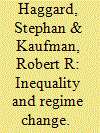

|
|
|
|
|
| Publication |
2012.
|
| Summary/Abstract |
Recent work by Carles Boix and Daron Acemoglu and James Robinson has focused on the role of inequality and distributive conflict in transitions to and from democratic rule. We assess these claims through causal process observation, using an original qualitative dataset on democratic transitions and reversions during the "third wave" from 1980 to 2000. We show that distributive conflict, a key causal mechanism in these theories, is present in just over half of all transition cases. Against theoretical expectations, a substantial number of these transitions occur in countries with high levels of inequality. Less than a third of all reversions are driven by distributive conflicts between elites and masses. We suggest a variety of alternative causal pathways to both transitions and reversions.
|
|
|
|
|
|
|
|
|
|
|
|
|
|
|
|
| 9 |
ID:
111845
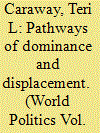

|
|
|
|
|
| Publication |
2012.
|
| Summary/Abstract |
Legacy unions-formerly state-backed unions that survived democratic transitions-are one of the most persistent legacies of authoritarian rule. While usually successful in maintaining their preeminent position, legacy unions have in some cases been overtaken by competing unions. Deploying a set of paired comparisons of legacy unions that entered the transition with similar legacies but experienced different fates-Indonesia with South Korea and Poland with Russia-this article examines why some legacy unions continued to dominate (Indonesia and Russia) and others did not (South Korea and Poland). The author identifies four pathways of change: endurance (Indonesia), attrition (South Korea), hegemony (Russia), and rupture (Poland). Several features of the transition context propelled legacy unions down distinct pathways of change-the widespread mobilization of workers outside of state-sponsored unions early in the transition, partisan links, and the structure of union competition.
|
|
|
|
|
|
|
|
|
|
|
|
|
|
|
|
| 10 |
ID:
097403
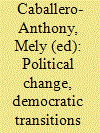

|
|
|
|
|
| Publication |
Oxon, Routledge, 2010.
|
| Description |
xvii, 159p.
|
| Standard Number |
9780415493536, hbk
|
|
|
|
|
|
|
|
|
|
|
|
Copies: C:1/I:0,R:0,Q:0
Circulation
| Accession# | Call# | Current Location | Status | Policy | Location |
| 055043 | 959.054/CAB 055043 | Main | On Shelf | General | |
|
|
|
|
| 11 |
ID:
075260
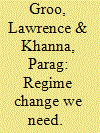

|
|
|
|
|
| Publication |
2006.
|
| Summary/Abstract |
Democracy fatigue threatens choose-your-color revolutions. Transparency of the executive can revitalize enthusiasm.
|
|
|
|
|
|
|
|
|
|
|
|
|
|
|
|
| 12 |
ID:
133715


|
|
|
|
|
| Publication |
2014.
|
| Summary/Abstract |
This article addresses the highly variable middle-class attitudes regarding political transitions and suggests that social mobility is a key factor conditioning its behavior. Social mobility creates a trade-off for the middle class between autocracy, which yields lower redistribution today, and democracy, which guarantees higher redistribution tomorrow. The way this trade-off is resolved impacts middle-class attitudes toward democratic transitions. Even when the middle class prefers lower redistribution levels under autocracy today, the middle class may prefer democracy today to guarantee higher levels of redistribution in the future, if it feels vulnerable about its future prospects.
|
|
|
|
|
|
|
|
|
|
|
|
|
|
|
|
| 13 |
ID:
081720
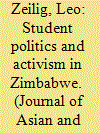

|
|
|
| 14 |
ID:
121613
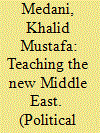

|
|
|
|
|
| Publication |
2013.
|
| Summary/Abstract |
In 2011 the protests in the Middle East and North Africa (MENA) were not only unprecedented in terms of scale and political consequences for the region, they also highlighted a number of long-standing analytical and theoretical misconceptions about Arab politics. In particular, the conventional thesis privileging the idea of a "durable authoritarianism" in the Arab world was partially undermined by a cross-regional civil society that confronted the formidable security and military apparatus of the state. Although in some countries democratic transitions have continued, since they first occurred in Tunisia, other Arab states continue to witness a resilient authoritarianism and strong state repression of civil society activism. These historic events have also set the stage for a new teaching agenda in important ways. Specifically, an agenda for teaching the "new Middle East" must incorporate two important general components: first, a critical review of the influential scholarship on persistent authoritarianism with the objective of addressing past theoretical and methodological misconceptions, and second, the introduction of new conceptual and analytical frameworks relevant to contemporary political developments in the Arab world and the MENA region more generally.
|
|
|
|
|
|
|
|
|
|
|
|
|
|
|
|
| 15 |
ID:
131793
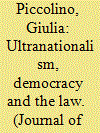

|
|
|
|
|
| Publication |
2014.
|
| Summary/Abstract |
Although much has been written about the ideology of Laurent Gbagbo's Front Populaire Ivoirien in Côte d'Ivoire and its impact on the Ivorian politico-military crisis, little attention has been paid to the ubiquitous role of the law in the discourse and political strategy of the pro-Gbagbo elite. The Ivorian case may provide important insights about the connection between ultranationalist ideology and a legalist, formalist conception of democracy and national sovereignty. The article analyses the circumstances of the emergence of 'legalist nationalism' in Côte d'Ivoire by looking at key episodes of the Ivorian transition between 2002 and 2012. The article discusses the relevance of Pierre Englebert's concept of 'legal command' and the turbulences of democratic transitions in accounting for the prominence of legalism in Ivorian politics. It explores the implications of the Ivorian case for understanding the connection between law and politics in Africa.
|
|
|
|
|
|
|
|
|
|
|
|
|
|
|
|
| 16 |
ID:
155744
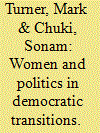

|
|
|
|
|
| Summary/Abstract |
This article addresses the question of what happens to women in democratic transitions. Of particular concern is whether women are encouraged to participate in politics and to stand as candidates for seats in national legislatures. In many instances, women have made only marginal progress in seeking election and getting elected in newly democratized regimes. This situation has been the experience of Bhutan, a country that held its first national elections only in 2007–2008. Despite women making significant gains in areas such as education, health and employment in Bhutan and guarantees of gender equality in the Constitution, they have made a poor showing in electoral politics. The article uses the explanatory framework of patriarchy to explore women’s minor participation in electoral politics. Of special concern are deeply rooted traditional concepts that have been employed today to exclude women from competing for and winning political office. The article concludes that because patriarchal attitudes are so deeply embedded only incremental progress will be made under current electoral rules. Alternatively, there could be quota systems as in some other South Asian countries.
|
|
|
|
|
|
|
|
|
|
|
|
|
|
|
|
|
|
|
|
|